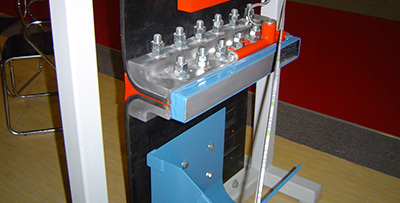News Center
Hezi technology focuses on the research and development of "rapid seamless conveyor belt joint sleeve" innovative technology project

NEWS CENTER

News Details
Understanding Quality Conveyor Belt Fasteners: Essential Components for the Chemical and Rubber Industry
Release time:
2025-05-23
In the chemical and rubber industry, the reliability of machinery and equipment is paramount, especially when it comes to handling materials through conveyor systems. One often overlooked yet crucial component of these systems is the conveyor belt fastener. Quality conveyor belt fasteners are essential for ensuring that belts remain secure and efficient during operation, which directly influences
In the chemical and rubber industry, the reliability of machinery and equipment is paramount, especially when it comes to handling materials through conveyor systems. One often overlooked yet crucial component of these systems is the conveyor belt fastener. Quality conveyor belt fasteners are essential for ensuring that belts remain secure and efficient during operation, which directly influences productivity and safety.
Conveyor belt fasteners serve to connect the ends of a conveyor belt, creating a seamless transport surface. This connection must endure the stresses of continuous use, fluctuations in temperature, and exposure to various materials. Therefore, the quality of these fasteners cannot be underestimated. High-quality fasteners are typically made from durable materials designed to withstand harsh environments, making them particularly important in industries such as chemical manufacturing, where exposure to corrosive substances is common.
When selecting conveyor belt fasteners, several factors should be considered. First, compatibility with the specific type of conveyor belt is essential. Different belt materials may require specific fastener designs to ensure a secure fit and optimal performance. Additionally, the tensile strength of the fastener should be evaluated to ensure it can handle the loads expected during operation. A fastener that is too weak may lead to belt failure, resulting in costly downtime and potential safety hazards.
Another important aspect is the installation process of the fasteners. Quality fasteners often come with easy-to-follow installation instructions and may even be designed for quick assembly, minimizing the time required for maintenance or replacement. This ease of use is particularly beneficial in the fast-paced environment of the chemical and rubber industry, where efficiency is crucial.
Moreover, proper maintenance of both the conveyor belt and its fasteners is vital. Regular inspections can help identify wear and tear early, preventing unexpected breakdowns. Maintaining a clean environment around the conveyor system can also prolong the life of both belts and fasteners, as debris buildup can lead to accelerated wear.
In conclusion, quality conveyor belt fasteners play a critical role in the efficiency and safety of operations within the chemical and rubber industry. By choosing the right fasteners and adhering to maintenance best practices, companies can enhance their productivity and reduce the risk of operational disruptions. Investing in high-quality fasteners is not just a matter of ensuring a secure connection; it is an essential strategy for long-term operational success.
Conveyor belt fasteners serve to connect the ends of a conveyor belt, creating a seamless transport surface. This connection must endure the stresses of continuous use, fluctuations in temperature, and exposure to various materials. Therefore, the quality of these fasteners cannot be underestimated. High-quality fasteners are typically made from durable materials designed to withstand harsh environments, making them particularly important in industries such as chemical manufacturing, where exposure to corrosive substances is common.
When selecting conveyor belt fasteners, several factors should be considered. First, compatibility with the specific type of conveyor belt is essential. Different belt materials may require specific fastener designs to ensure a secure fit and optimal performance. Additionally, the tensile strength of the fastener should be evaluated to ensure it can handle the loads expected during operation. A fastener that is too weak may lead to belt failure, resulting in costly downtime and potential safety hazards.
Another important aspect is the installation process of the fasteners. Quality fasteners often come with easy-to-follow installation instructions and may even be designed for quick assembly, minimizing the time required for maintenance or replacement. This ease of use is particularly beneficial in the fast-paced environment of the chemical and rubber industry, where efficiency is crucial.
Moreover, proper maintenance of both the conveyor belt and its fasteners is vital. Regular inspections can help identify wear and tear early, preventing unexpected breakdowns. Maintaining a clean environment around the conveyor system can also prolong the life of both belts and fasteners, as debris buildup can lead to accelerated wear.
In conclusion, quality conveyor belt fasteners play a critical role in the efficiency and safety of operations within the chemical and rubber industry. By choosing the right fasteners and adhering to maintenance best practices, companies can enhance their productivity and reduce the risk of operational disruptions. Investing in high-quality fasteners is not just a matter of ensuring a secure connection; it is an essential strategy for long-term operational success.

Recommend News





























